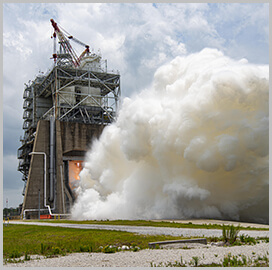NASA subjected the RS-25 rocket engine to a hot fire test on Nov. 29.
The test was the third in a 12-part series meant to certify new manufacturing processes used by L3Harris Technologies company Aerojet Rocketdyne to produce the version of the engine that will power the Space Launch System for the Artemis V mission and beyond, NASA said Wednesday.
During the test, the RS-25 was made to run for 650 seconds at 113 percent power. During actual operation, the engine would have to run for 500 seconds at 111 percent power. The test pushed the engine past normal operational parameters to provide for a margin of operational safety.
The test was conducted at NASA’s Stennis Space Center. It was overseen by a team of operators from the space agency, Aerojet and Syncom Space Services, the prime contractor for facilities and operations at Stennis.





